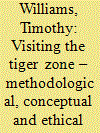| Srl | Item |
| 1 |
ID:
166672


|
|
|
|
|
| Summary/Abstract |
The genocide perpetrated by the Khmer Rouge between 1975 and 1979 appears as one of the most totalitarian manifestations of political violence in the 20th century. This article explores the ideological framework constructed by the Khmer Rouge, and looks into whether and how this influences and motivates individual low-level cadres in their participation. Our findings show that toxification as a genocidal ideology was present in the Khmer Rouge discourse, and provided a lens of legitimacy for individuals to engage in acts of violence. But such a genocidal ideology was not a motivating factor for individual perpetrators in the Cambodian genocide. This research forwards the comparative investigation of the Khmer Rouge genocide in Cambodia as an important case of genocide, both at the societal and individual levels, as well as the general study of toxification as a genocidal ideology.
|
|
|
|
|
|
|
|
|
|
|
|
|
|
|
|
| 2 |
ID:
161136


|
|
|
|
|
| Summary/Abstract |
This article is a methodological, conceptual and ethical reflection on challenges and opportunities afforded to ethnographic researchers in the field when working with perpetrators of mass violence and their motivations. Departing from a research project on the motivations of former cadres of the Khmer Rouge and fieldwork conducted on this topic in Cambodia, various possible approaches to conducting such ethnographic research are discussed, focusing on long-term stays in the community, frequent visits and building networks in the community, and repeat individual visits to select people without embedding oneself as a researcher in the community. For each of these approaches their distinct strengths and limitations are considered in light of various methodological, conceptual and ethical challenges encountered by the author in the field. As such, this article does not suggest specific methodological developments but offers a critical reflection of how various approaches to an ethnography of perpetrators can variously deal with these challenges.
|
|
|
|
|
|
|
|
|
|
|
|
|
|
|
|